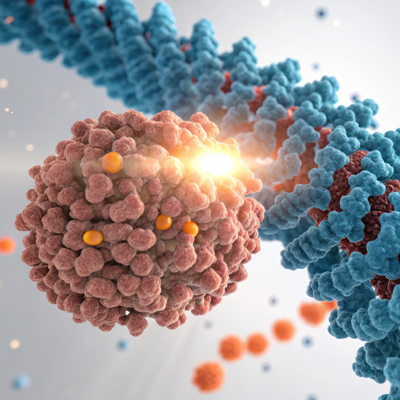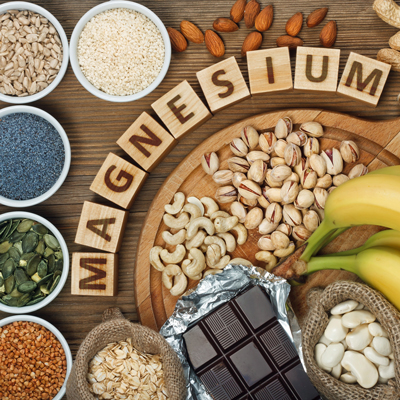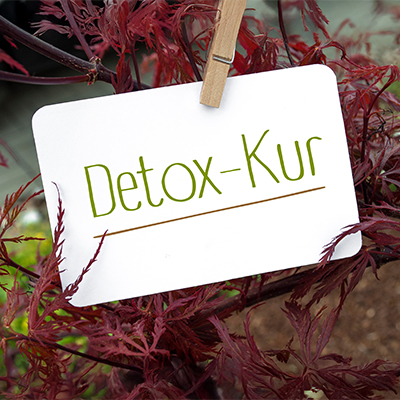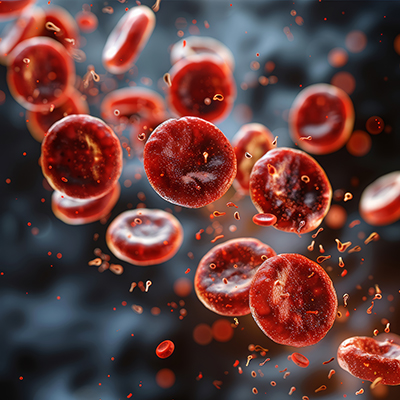Pregnancy
All information about "Pregnancy" and the related magazine articles can be found here.
Our articles are written clearly and link to scientific studies where relevant. This is how we meet our own standards: we regularly deliver new, high-quality content for you—free of charge, no sign-up required, with the highest possible benefit to you.

Naturally against allergies - Black cumin oil and quercetin in use for your well-being
Gentle support from nature for hay fever, pollen allergies and allergic reactions
Itchy eyes, sneezing attacks and constant pollen stress? Black cumin oil and quercetin offer natural help for allergic symptoms. Find out how the two herbal active ingredients work, when it is the right time to use them and what you should look out for when choosing them.

Strong through the pollen season with omega-3 and vitamin E
How to strengthen your child's airways
When pollen irritates the airways, it can quickly become unpleasant for children. Find out why omega-3 and vitamin E can not only support but also prevent and how you can easily incorporate the two substances into your everyday life!

Fit for spring: Stimulate metabolism with inulin, probiotic foods & intestinal cure
Intestinal cleansing for better digestion, the natural effects of inulin and the benefits of probiotic foods for your metabolism
Get a vital start to spring and bring your body into balance - with targeted nutrition that boosts your metabolism, supports digestion and rebalances your gut with the help of a gut cleanse, inulin and probiotic foods. Find out how to boost your gut health and gain new energy - from the inside out!

New cell energy with B vitamins, NADH and alpha lipoic acid
NADH, alpha lipoic acid and B vitamins play a central role in human metabolism for energy, concentration and cell protection.
Discover how these nutrients support the body against exhaustion, oxidative stress and loss of performance - for more vitality and mental strength in everyday life!

Sleep better with lemon balm, passionflower and L-theanine
These natural helpers bring peace to your evening
Sleep disorders? Stress in the evening? Herbal helpers such as lemon balm, L-theanine and passionflower can gently support the sleep-wake rhythm and help you to finally calm down. Read the article now to find out how you can harness the power of nature for restful nights.

Spring fever for the soul
Naturally more balance with 5-HTP, L-tryptophan and vitamin B6
The sun is shining - but everything still feels heavy inside?
These three mood boosters gently help you arrive in spring: for more rest, sleep and stability. Find out more here!

Building inner strength - more relaxed through spring
Plant adaptogens for more balance, energy and mental freshness
Spring is the perfect time to recharge your batteries and do something good for yourself. Rhodiola and cordyceps provide natural and effective support. Find out more here!

Strengthen your immune system with rockrose, zinc and vitamin C
Natural support for your immune system
Cistus, zinc and vitamin C can provide your body with valuable support in moody weather. Find out how these three building blocks gently strengthen your defenses and give you more well-being in everyday life.

Start spring naturally fit with L-citrulline & cordyceps and recharge your batteries
Experience the invigorating power of nature and science. For new energy, strong blood vessels and mental freshness. Ideal for anyone who wants to get off to a powerful start.
The days are getting longer, the light is returning and now is the time to give your body a gentle boost. The combination of L-citrulline, an amino acid that promotes blood circulation, and the vital mushroom cordyceps supports you in a natural way. For more performance, better focus and an all-round vital body feeling.

Moving through spring: supporting joints naturally with MSM, glucosamine and chondroitin
Find out how your joints work - and how targeted nutrients, exercise and high-quality supplements can promote your mobility.
Movement is often difficult after winter. Stiff joints and limited range of motion are not uncommon. Natural active ingredients such as MSM, glucosamine and chondroitin can help to support normal joint function and prevent discomfort. Now is the ideal time to get going with renewed energy. Moving, vital and well nourished into spring.

Vitamin D3 and K2: the perfect combination for bones and well-being
Find out why vitamin D3 and K2 are so important, especially in the dark season, and how they support your immune system and bone health.
Vitamin D3 helps to banish the winter blues, while vitamin K2 promotes the optimal utilization of calcium. Discover the best food sources and find out when targeted supplementation can be useful.

Stopping cravings: How chromium stabilizes your blood sugar levels
Find out why the trace element chromium can reduce cravings and how it supports your metabolism.
Chromium helps regulate blood sugar levels, helps prevent sudden hunger and promotes long-term wellbeing. Discover the benefits of this important nutrient and find out how you can specifically integrate it into your diet!

Thanks to bitter substances and enzymes, a naturally spring-fit and healthy digestion
Find out how bitter substances and enzymes stimulate your digestion, alleviate digestive problems and gently balance the gastrointestinal tract.
Bitters and enzymes naturally support digestion, relieve bloating and promote general well-being. Discover how you can get off to a fresh and stomach-friendly start with bitter foods, the right diet and high-quality food supplements. For a good gut feeling, day after day.

Clear head, full focus - with ginseng & ginkgo
More concentration, less stress: Natural support for everyday life
Spring brings fresh energy - but sometimes your head feels foggy rather than clear? Ginseng and ginkgo are proven plants that can help boost focus and mental performance. Whether for learning, at work or simply for more mental freshness - discover how this power combination can take your concentration to a new level!

Springtime is liver time! How milk thistle & choline take the strain off your liver
Find out how choline, milk thistle and a conscious diet regenerate your liver and support your metabolism in a natural way.
After months of heavy eating, your liver also needs a break. Choline and milk thistle promote natural detoxification, strengthen the fat metabolism and provide fresh energy for body and mind. Discover how you can make your liver fit for spring with targeted nutrition and vital substances. Scientifically sound and naturally effective.

Iron deficiency? How iron tablets support your vitality
In the cold season, a sufficient iron level is particularly important for energy, blood formation and well-being.
Find out which iron supplements optimally support the body, what you should pay attention to when taking them and how you can specifically prevent iron deficiency. For more strength and vitality in winter!

Strengthening the immune system in the cold season. Magnesium as a key mineral
Find out why magnesium is essential for a strong immune system and how you can optimally cover your requirements.
Especially in the cold season, magnesium supports the body's own defenses, ensures normal muscle function and helps to maintain energy. Discover magnesium-rich foods and practical nutrition tips for resilient health in winter!

Detox cure with L-arginine: Detoxify & recharge your energy
Find out how L-arginine supports your detoxification, boosts your metabolism and improves your athletic performance.
With a 5-day detox plan, you can cleanse your body in a targeted manner, promote blood circulation and increase your well-being. For more energy and an all-round good feeling!

Goodbye winter skin: Radiant skin with biotin, hyaluronic acid & omega-3
Discover the best nutrients for supple and resilient skin in the cold season.
Biotin promotes skin renewal, hyaluronic acid provides deep moisture and omega-3 strengthens the skin's protective barrier. Find out how you can optimally care for your skin and enjoy the winter with a radiant complexion!

Support hormonal balance in spring naturally with monk's pepper and vitamin B6
For a stable cycle and greater well-being
Spring brings change - also for the hormone balance. Monk's pepper and vitamin B6 can help to alleviate PMS symptoms and regulate the menstrual cycle. Discover natural ways for more balance and well-being!

Radiant skin in spring with zinc and OPC
Support skin renewal and bring back the natural glow
Now that spring is here, your skin needs new energy. Find out how you can improve the appearance of your skin with targeted care, zinc and OPC - for a fresh, radiant complexion in spring. Find out more now!

Winter salad with chia: Superfood for the cold season
Discover delicious and nutritious winter salad recipes with chia seeds, turmeric and fresh winter vegetables.
Chia provides valuable omega-3 fatty acids and fiber, while crunchy ingredients ensure enjoyment and variety. Be inspired and enjoy healthy, delicious salads in winter!

More oxygen, more energy: Iron and vitamin C as a spring turbo
Are you already feeling the spring, but not yet at full power?
Maybe your body is missing just the right combination of iron and vitamin C! Find out why these two nutrients can increase your blood oxygen saturation - and how you can regain your vitality in no time at all. Leave fatigue behind and start the warm season with fresh energy!

Activate metabolism for more energy with L-carnitine & omega-3
How to keep your body active without dieting stress
Spring is calling, and with it comes the desire for more energy and a fit body. L-carnitine and omega-3 fatty acids can gently support your metabolism by boosting fat burning and reducing oxidative stress. Find out why now is the perfect time to give your system a boost!
Optimal Supply During Pregnancy: Tips and Advice for Expecting Mothers
Pregnancy is an incredible journey in a woman's life, marked by physical changes, emotions, and anticipation of the upcoming family member. From the first signs to the birth of the child and beyond, each phase is significant and brings a wealth of questions, hopes, and challenges. From the absence of menstruation and the first pregnancy test to the due date, exciting experiences await. Learn more about the various aspects of pregnancy and get well-founded information and useful advice to support expecting mothers on their journey.
How to Recognize Pregnancy?
The signs of being pregnant can vary from case to case. Typical early symptoms include the absence of menstruation, nausea, fatigue, more sensitive breasts, and increased urination. A pregnancy test can turn positive as soon as the body produces sufficient amounts of the pregnancy hormone hCG, which typically occurs about two weeks after conception. However, a pregnancy test can yield both false positive and false negative results. It is therefore recommended to consult a doctor as soon as possible after a positive pregnancy test or suspicion of pregnancy to confirm implantation and receive necessary medical care. An absent period should also be clarified regardless of the results of a pregnancy test. Some women may experience first signs of being pregnant just a few days after conception, while others may take a little longer to notice changes.
What Helps with Nausea During Pregnancy?
Pregnancy nausea is hormonally induced and often occurs from the fifth or sixth week of pregnancy, but can also occur earlier or later. There are various remedies and strategies that can provide relief from nausea. Some expectant mothers find relief through small, frequent meals (e.g., crispbread) that are rich in carbohydrates and low in fat. Ginger in the form of tea, candies, or capsules can also be useful in reducing nausea and vomiting (1).
Acupressure bracelets worn on the wrist can alleviate nausea in some women (1). It is important to consume enough fluids, especially in the form of clear drinks such as water or ginger tea. In case of severe or persistent symptoms, it is advisable to consult a doctor to discuss further treatment options.
Further useful information on the topic can be found here: /blog/where-does-pregnancy-nausea-come-from
Overview: What Happens in Each Week of Pregnancy?
Pregnancy lasts an average of 40 weeks, divided into three trimesters. The exact number of pregnancy weeks can vary as the time of conception is not always precisely known. To calculate the pregnancy week, the first day of the last menstruation is used as a starting point. There are numerous pregnancy week calculators and tables available to track progress.
Different developments occur in the body of the child and the pregnant woman during each pregnancy week. As the child develops rapidly, it is important for women who decide against having a child to make this decision promptly to consider all available options and, if necessary, take appropriate steps. Abortion is legal in many countries up to the 12th week of pregnancy, but legal regulations may vary depending on the country. It is important for women to receive all available information and support to make an informed decision.
Here is an overview of the pregnancy weeks and the corresponding changes (2):
1.-4. Week: Implantation of the fertilized egg, beginning of organ formation.
5.-8. Week: Developmental phase of organs and body systems, heartbeat of the embryo.
9.-12. Week: Completion of organ formation, formation of finger and toe rudiments.
13.-16. Week: Fetal growth, movements become noticeable, first ultrasound examinations.
17.-20. Week: Developmental phase of the skeletal system, determination of the baby's sex, first movements felt by the pregnant woman.
21.-24. Week: Further fetal growth, developmental phase of the brain.
25.-28. Week: Fetus begins to turn upright, opening and closing of the eyelids.
29.-32. Week: Baby's weight gain, developmental phase of the immune system.
33.-36. Week: Preparation for birth, baby descends into the pelvis.
37.-40. Week: Completion of organ development, baby is ready for birth.
It is important to note that the developmental stages of each baby are individual and may vary from case to case.
When Does the Belly Start to Grow?
The time when the belly starts to grow can vary and depends on various factors, including the woman's individual anatomy, the size of the baby, and whether the mother is pregnant for the first time or not. Typically, women, especially first-time mothers, begin to notice a slight increase in belly size towards the end of the first trimester (around the 12th to 16th week of pregnancy) as the uterus expands and the baby grows. In women who have been pregnant before, the belly may start to grow earlier, possibly around the 10th week of pregnancy or even earlier.
What Helps with Heartburn?
In addition to nausea and vomiting, heartburn is another symptom reported by many pregnant women. Various measures can help against heartburn, including (3):
Small Meals: Instead of large meals, frequent small meals can be consumed to avoid overloading the stomach.
Upright Posture After Eating: Remain upright for at least an hour after eating to prevent stomach contents from entering the esophagus.
Avoidance of Certain Foods: Spicy, fatty, and acidic foods as well as caffeinated beverages can exacerbate heartburn and should be avoided.
Sleeping with Elevated Upper Body: Sleeping with a slightly elevated upper body can help reduce heartburn.
Natural Remedies: Ginger, chamomile tea, or almonds can help alleviate heartburn.
Medication: In some cases, the doctor may recommend taking medication to bind stomach acid to relieve heartburn (3). However, it is important to consult a doctor to ensure the safety and appropriateness of medications during pregnancy.
If heartburn is severe or frequent, it is important to discuss this with a doctor to take appropriate countermeasures. More information on heartburn can be found here.
When Is the Critical Time Over?
The critical phase in pregnancy, also known as the first trimester, typically ends after the first 12 weeks or three months. Complications and miscarriages are more common during these months, especially in the first weeks. After the first trimester, the likelihood of miscarriage and pregnancy complications usually decreases significantly, and the fetus develops and grows in size. However, it is important to note that each pregnancy period is individual, and problems may also occur in later trimesters. It is therefore advisable to pay attention to the health and well-being of the mother throughout the months and to undergo regular check-ups from the absence of menstruation.
From When Is a Baby Viable Outside the Womb?
A baby is generally considered viable outside the womb from the 24th week of pregnancy, as at this stage the organs and systems of the fetus are sufficiently developed to survive outside the uterus, albeit with intensive medical support (4).
Premature births occurring before the 37th week of pregnancy, however, can be associated with a range of complications. These include respiratory problems due to lung immaturity, inability to regulate body temperature, difficulties in feeding and digestion, as well as an increased risk of infections and developmental delays (4).
The consequences of premature birth can range from mild to life-threatening problems, and the chances of survival and long-term health prospects depend on various factors such as the age of the child at birth, the quality of medical care, and individual health conditions.
What Is Pregnancy Poisoning?
Pregnancy poisoning, also known as preeclampsia, is a serious condition during pregnancy characterized by high blood pressure and protein in the urine after the 20th week of pregnancy, i.e., in the later months. The causes of this are not fully understood, but problems with the placenta and blood vessels play a role. Symptoms include high blood pressure, headaches, vision disturbances, nausea, abdominal pain, and water retention. Untreated, pregnancy poisoning can lead to eclampsia, liver or kidney failure, and even death (1). Treatment involves blood pressure control, monitoring, medication, and possibly termination of pregnancy. Early recognition of signs and symptoms as well as more frequent prenatal examinations in the weeks and months from the middle of the pregnancy period are important.
Why Can There Be Gestational Diabetes?
Gestational diabetes occurs in pregnant women when the body does not produce enough insulin to cope with the increased blood sugar level. Pregnancy hormones can impair insulin action, leading to elevated blood sugar levels. Risk factors include obesity, family history of diabetes, and previous cases of gestational diabetes. Untreated, it can lead to complications for both mother and child, such as an increased likelihood of cesarean section, preterm birth, and higher birth weight of the child (6).
Signs of gestational diabetes can include:
Frequent Urination: Frequent urination can be an initial symptom as the body eliminates excess sugar through urine.
Excessive Thirst: Increased fluid excretion can lead to increased thirst.
Fatigue: Gestational diabetes can cause fatigue as the body is unable to effectively use sugar to produce energy.
Vision Problems: Some women may notice vision problems as high blood sugar affects fluid balance in the eye.
Weight Gain: Unexplained weight gain despite a healthy diet and exercise may be a symptom of gestational diabetes.
Infections: Pregnant women with gestational diabetes may be prone to urinary tract infections or vaginal yeast infections.
Control measures include regular blood sugar monitoring, a balanced diet with a low glycemic index, regular physical activity, and in some cases insulin therapy. Early diagnosis and regular medical care are crucial to minimize the risk of complications.
Which Pregnancy Vitamins Are Beneficial?
Pregnancy vitamins play a crucial role in supporting the health of both mother and child during pregnancy. Here are some important vitamins (7):
Folic Acid (Folate): Supports the formation of the neural tube and can prevent neural tube defects such as spina bifida. The recommended intake is 400 micrograms per day.
Vitamin D: Important for bone formation and calcium absorption. It is recommended to take a vitamin D supplement of 10 micrograms per day.
Iron: Supports the formation of red blood cells and helps prevent iron deficiency anemia. The recommended intake is 30 milligrams per day.
Calcium: Important for bone formation and tooth development. The recommended intake is 1,000 milligrams per day.
Omega-3 Fatty Acids: Important for brain and eye development in the fetus. The recommended intake is 200-300 milligrams of DHA per day.
Iodine: Important for thyroid function and brain development in the fetus. The recommended intake is 220 micrograms per day.
Pregnant women should ideally obtain these vitamins through a balanced diet rich in fruits, vegetables, whole grains, lean proteins, and dairy products. In some cases, however, it may be necessary to supplement certain vitamins to meet the increased demand during pregnancy. It is important to consult a doctor or midwife before taking any supplements to ensure the appropriateness and dosage.
What Should You Eat During Pregnancy?
If you are pregnant, a balanced diet is crucial to support both the mother's health and the baby's development. It is recommended to consume a variety of nutrient-rich foods, including fruits, vegetables, whole grains, lean proteins such as lean meats, fish, legumes, nuts, and seeds. Dairy products also provide important sources of calcium.
In the early weeks of pregnancy, it is particularly important to ensure adequate intake of folic acid to reduce the risk of neural tube defects. Smaller, more frequent meals can help alleviate nausea. Drinking enough water is also important to keep the body hydrated and alleviate potential pregnancy discomfort.
What Should Pregnant Women Avoid Eating?
Pregnant women should avoid certain foods to reduce the likelihood of complications during pregnancy. These include:
- Raw or undercooked meat
- Raw fish
- Raw eggs and products containing raw eggs
- Raw milk and unpasteurized dairy products
- Soft cheeses such as Camembert, Brie, or Feta
- Raw sprouts
These products should be avoided as they can increase the risk of food poisoning from bacteria or parasites, salmonella infections, and toxoplasmosis.
Tt is also recommended to reduce consumption of highly caffeinated beverages and to completely avoid alcohol consumption during the months leading up to the due date and also during breastfeeding, as alcohol can increase the risk of birth defects and developmental disorders such as FASD (8).
Tips for the Postpartum Period!
The postpartum period, also known as the postpartum phase, is an important time of recovery for the mother after childbirth. Here are some useful tips:
Adequate Rest and Recovery: Prioritize adequate sleep and rest periods to recover from the efforts of childbirth and adjust to the new situation.
Seek Support: Accept help from your partner, family members, or friends to receive support in caring for the newborn, household chores, and other daily tasks.
Healthy Nutrition: Pay attention to a balanced diet rich in nutrients that provides you with energy for your own recovery and for caring for the baby. Drink enough water to stay hydrated.
Personal Care: Take time for regular personal care, including showers or relaxation rituals, to feel fresh and groomed.
Explore Your Emotions: The postpartum period can be accompanied by emotional highs and lows. Openly discuss your feelings and seek professional support if needed to cope with mood swings or emotional challenges.
Stay Connected: Maintain contact with friends and family members to receive social support and avoid feeling isolated.
Gentle Exercise: Start slowly with gentle exercise such as walks to promote circulation and gradually reactivate your body. However, avoid excessive exertion and listen to your body.
Breastfeeding: If you are breastfeeding, seek support from a lactation consultant or specialist in case of problems or uncertainties to establish a successful breastfeeding relationship.
Bonding with the Baby: Use this time to build a bond with your newborn by promoting skin-to-skin contact, cuddling, and quiet moments of interaction.
Regular Doctor Visits: Keep regular appointments with your doctor to monitor your recovery, ask questions, and, if necessary, receive medical support.
Sources
[2] https://www.netdoktor.de/schwangerschaft/schwangerschaftswochen/
[3] https://www.netdoktor.de/schwangerschaft/sodbrennen-in-der-schwangerschaft/
[4] https://www.frauenaerzte-im-netz.de/schwangerschaft-geburt/frueh-und-fehlgeburt/
[5] https://www.usz.ch/krankheit/schwangerschaftsvergiftung/
[6] https://flexikon.doccheck.com/de/Schwangerschaftsdiabetes
[7] https://www.tk.de/techniker/magazin/familie/schwangerschaft-vitamine-mineralstoffe-2009392?tkcm=ab
